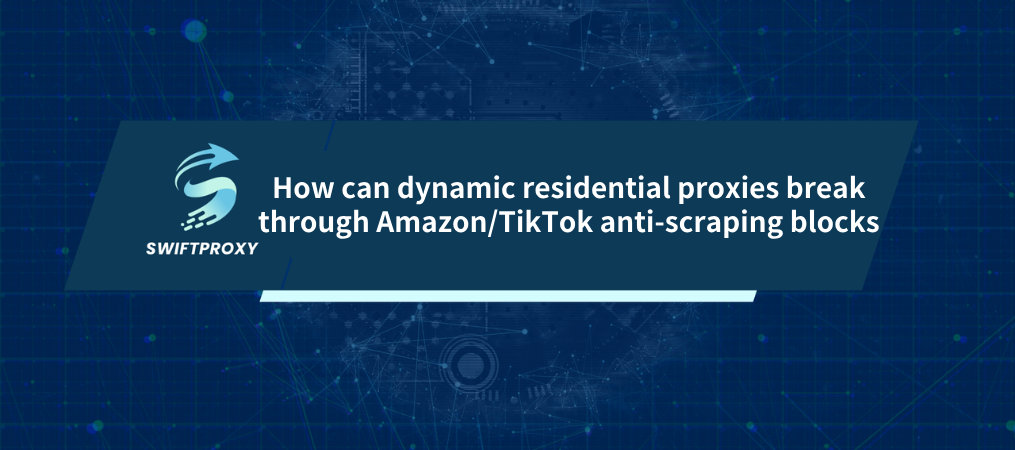How can dynamic residential proxies break through Amazon/TikTok anti-scraping blocks in 2025?

Platforms like Amazon and TikTok have implemented strict anti-scraping strategies to protect their users and data. Dynamic residential proxies, as an advanced network tool, provide an effective solution to break through these anti-scraping blocks.This article will take a deep dive into how dynamic residential proxies work, their benefits, and how they can be successfully applied on Amazon and TikTok for the purposes of data scraping and market analysis.
How Dynamic Residential Proxy Works
Dynamic residential proxy is a web proxy service that uses real residential IP addresses to access target websites. Compared with traditional data center proxies, residential proxies have higher anonymity and less risk of being blocked. Dynamic residential proxies change IP addresses regularly to avoid being identified as crawlers by target websites.
Advantages of dynamic residential proxies
- High anonymity: Using real residential IP addresses reduces the risk of being detected and blocked.
- Geographic location simulation: It can simulate visits from different regions to break through geographical restrictions.
- IP address rotation: Regularly change IP addresses to avoid being identified by anti-crawler strategies.
- Increase access speed: Using high-quality proxy IPs can improve the efficiency of data scraping.
Analysis of Amazon/TikTok anti-crawling technology upgrades in 2025
1. AI behavioral fingerprint detection
- TikTok added a traffic timing analysis model to identify machine behavior through mouse tracks and API request intervals
- Amazon uses the JA4H fingerprint algorithm to detect proxy IP protocol stack anomalies within 0.2 seconds
2. IP quality scoring system
- TikTok introduced the IP reputation chain (IPRC) to associate historical violation records to generate risk values
- Amazon marks residential proxies with ASN credibility weight (such as Starlink IP weight is only 0.37)
3. Environmental camouflage depth verification
- WebRTC fingerprint and IP geographic error must be ≤3km
- Browser Canvas rendering hash value matching rate must be >92%
Dynamic residential proxy breakthrough solution (four-layer defense system)
1. Intelligent IP rotation engine
Core parameter configuration
# Dynamically adjust IP survival time based on target website response code
def ip_ttl_controller(response_code):
if response_code == 403:
return random.randint(12, 25) # 单位:秒
elif "captcha" in response.text:
return 45 # Mandatory extension to human-machine verification cycle
else:
return 180 # Normal crawling cycle
2. Protocol stack deep camouflage
12 TCP/IP parameters that must be modified:
- TTL value fluctuation (Windows default 128 → camouflaged as dynamic 72-131)
- TCP Window Size is generated according to the characteristics of the home router model
- Disable IPv6 DNS resolution (to prevent address pool leakage)
3. Browser environment simulation
Key indicator achievement plan:
| Detection items | Cracking tools |
| Canvas Fingerprint | Canvas Defender Pro |
| WebGL Metadata | WebGL Fake Device |
| Time zone and IP geographical deviation | GeoSpy API Synchronous Calibration |
Conclusion
As an advanced network tool, dynamic residential proxy provides an effective solution to break through the anti-scraping blockade of platforms such as Amazon and TikTok. By selecting the right proxy service provider, configuring a reasonable request frequency, simulating human behavior, and using advanced camouflage technology, we can successfully scrape data and achieve business goals. However, we also need to pay attention to compliance and ethical issues to avoid violating relevant laws and regulations and platform terms of service.

















































